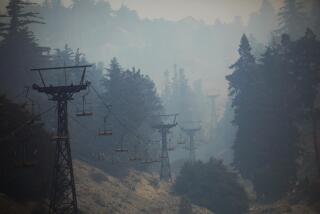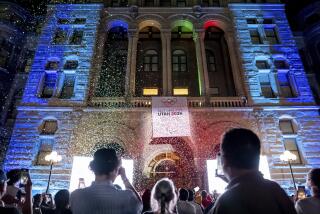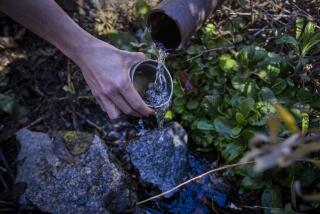Banned from ski-only slopes, snowboarders in Utah file suit
On picturesque winter slopes, the youngsters racing snowboards downhill and the mature skiers calmly gliding down have routinely been cast as warring snow-lovers.
A Utah ski resort has tried to keep feuding off its slopes by banning snowboards altogether since the 1980s. Four middle-aged snowboarders are protesting that policy, filing a lawsuit in January.
The snowboarders sued Alta Ski Area and the U.S. Forest Service in U.S. District Court in Utah. They argue that their constitutional right to equal use of federal land had been irrationally denied and that the Forest Service, working in concert with Alta, allowed discrimination in violation of the snowboarders’ due process rights.
Alta Ski Area, 30 miles southwest of Salt Lake City, covers about 1,800 acres of the Unita-Wasatch-Cache National Forest as part of a 40-year lease through 2042.
This week, the Forest Service joined Alta in asking a federal judge to dismiss the lawsuit, contending that the allegations lacked common sense.
Federal officials make “thousands of decisions about which uses and activities are allowed or are not allowed on its vast land-holdings,” government lawyers said. If courts accepted constitutional challenges by small groups whose desired use was barred, officials would be constantly fighting these lawsuits. The agency offered as an example the National Elk Refuge in Wyoming, where fishing from the bank is banned but fly-fishing is allowed.
Alta, in its court filing two weeks ago, pointed out that some trails allow hiking, horseback riding and bicycling, while others allow just one of those activities and bar the rest.
The Forest Service and Alta have defended their anti-snowboarding stance as promoting safety and keeping the resort’s customers happy.
Alta is not “discriminating against anyone based on a protected class or fundamental right,” the government said.
Alta’s lawyers described the situation to U.S. District Judge Dee Benson like this: “It demeans the Constitution to suggest that the amendment that protected the interests of former slaves during Reconstruction and James Meredith and the Little Rock Nine must be expanded to protect the interests of those who engage in a particularized winter sport.”
In a footnote to that paragraph, attorneys Frederick R. Thaler and Robert O. Rice remarked, “To state the obvious, unlike race, which is an immutable characteristic that cannot be changed, plaintiffs can change the equipment on their feet from a snowboard to skis in a minute or two.”
They argue that snowboarders have blind spots while skiers can see clearly in front of them. There’s also the issue of flat terrain, which is common at Alta. Skiers can propel themselves with poles if they get stuck. Snowboarders have to remove their bindings and walk, a pause that creates dangerous congestion, Alta says.
The Forest Service said its leases give businesses like Alta plenty of leeway to do as they please without interference from federal officials. In other words, there’s not some secret collusion to deny snowboarders access to slopes at any of the about 120 resorts on federal land.
“The mere fact that Alta operates most of its ski resort on public property does not establish state action,” government lawyers wrote this week. “Alta reserves the right to exclude those whose ‘skiing device’ is deemed to create an ‘unnecessary risk,’ causes ‘undue damage to the quality of the snow,’ and ‘is not consistent with [Alta’s] business management decisions.’”
Lawyers for the snowboarders have said that just two other ski resorts in the U.S. bar snowboarding: Deer Valley Resort in Utah and Mad River Glen in Vermont. Only Alta sits partially on federal land, according to attorney Jonathan Schofield.
Alta, citing a 2006 survey, said 40% of skiers called the resort their favorite because of the no-snowboards policy.
About 7 million people in the U.S. snowboarded slopes during the 2012-13 season and 8 million people skied them, according to SnowSports Industries America. Injury rates for snowboarders “have fluctuated over time but currently remain higher than in skiers,” a sports medicine study published in 2012 found.
All of the defenses used by the ski resort and the government had been considered before the lawsuit was filed, Schofield told the Los Angeles Times.
“Like Alta, the Forest Service mischaracterizes our complaint, confuses applicable law, and entirely avoids the animus issues,” he said in an email. “We’ll address all of these issues fully in our opposition brief, which will be filed in approximately one month.”
The plaintiffs include 37-year-old professional snowboarder Bjorn Leines and three others from Utah who have been snowboarding since their late teens in the 1980s. They covet Alta’s terrain because it gets more snow than other area resorts.
Denying them access “perpetuates inequality” and fosters “hostile and divisive” skier-versus-snowboarder attitudes “in a world where skiers and snowboarders, as a general matter, share the mountains, including those on all other public land, in harmony and without issue,” their attorneys argue.
More to Read
Sign up for Essential California
The most important California stories and recommendations in your inbox every morning.
You may occasionally receive promotional content from the Los Angeles Times.











